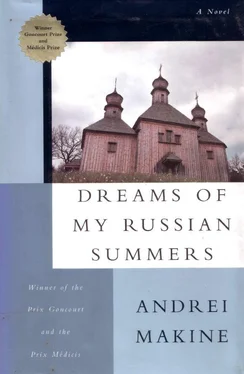
Andrei Makine
Dreams Of My Russian Summers
Andrei Makine
Dreams Of My Russian Summers
TRANSLATED FROM THE FRENCH BY Geoffrey Strachan
For Marianne Véron and Herbert Lottman
For Laura and Thierry de Montalembert
… it was with a childish pleasure and a profound emotion that, being unable to mention the names of so many others who must have acted similarly and thanks to whom France has survived, I gave the real names here…
– Marcel Proust, Le Temps retrouvé
Does the Siberian ask heaven for olive trees, or the Provençal for cranberries?
– Joseph de Maistre, Les Soirées de St. Petersbourg
I questioned the Russian about his method of work and was astonished that he did not make his translations himself, for he spoke a very pure French, with just a hint of hesitation, on account of the subtlety of his thought.
He confessed to me that the Académie and its dictionary froze him.
– Alphonse Daudet, Trente ans de Paris
Andrei' Makine was born and brought up in Russia but wrote Dreams of My Russian Summers in French, living in France. In this novel the lives of the characters move back and forth between two countries and two languages. Makine uses a number of Russian words that evoke features of Russian life, and I have generally left these as English transliterations of Russian, for example: izba (a traditional wooden house built of logs); shapka (a fur hat or cap, often with ear-flaps); babushka (a grandmother); taiga (the virgin pine forest that spreads across Siberia, south of the tundra); kasha (the staple dish of cooked grain or groats); kulak (a peasant farmer, working for his own profit); kolkhoznik (a member of a collective farm).
But I have also left in French a few phrases where the foreign or evocative sound for Russian ears seems to me as important as the meaning, for example: "petite pomme" ("little apple"); Belle Epoque (the era in France before the First World War); "cher confrère" ("dear colleague"); an echo of Flaubert's remark, "Madame Bovary c'est moi" (" Madame Bovary is me"); the opening couplet from La Fontaines fable of the wolf and the lamb, "La raison du plus fort est toujours la meilleure /Nous Vallons montrer tout à l'heure …" ("The strongest always stand to win/The argument, as shown herein…"), which features in an elocution lesson; and the elusive French "je ne sais quoi" (an indefinable something).
While still a child, I guessed that this very singular smile represented a strange little victory for each of the women: yes, a fleeting revenge for disappointed hopes, for the coarseness of men, for the rareness of beautiful and true things in this world. Had I known how to say it at the time I would have called this way of smiling "femininity."… But my language was too concrete in those days. I contented myself with studying the women's faces in our photograph albums and identifying this glow of beauty in some of them.
For these women knew that in order to be beautiful, what they must do several seconds before the flash blinded them was to articulate the following mysterious syllables in French, of which few understood the meaning: "pe-tite-pomme. "… As if by magic, the mouth, instead of being extended in counterfeit bliss, or contracting into an anxious grin, would form a gracious round. The whole face was thus transfigured. The eyebrows arched slightly, the oval of the cheeks was elongated. You said "petite pomme," and the shadow of a distant and dreamy sweetness veiled your gaze, refined your features, and caused the soft light of bygone days to hover over the snapshot.
This photographic spell had won the confidence of the most diverse women: for example, a relative from Moscow in the only color photo in our albums. Married to a diplomat, she spoke through clenched teeth and sighed with boredom before even hearing you out. But in the photo I could immediately identify the "petite pomme" effect.
I observed its aura on the face of a dull provincial woman, some anonymous aunt, whose name only came up when the conversation turned to the women left without husbands after the male slaughter of the last war. Even Glasha, the peasant of the family, in the rare photos that we still possessed of her, displayed the miraculous smile. Finally there was a whole swarm of young girl cousins, puffing out their lips while trying to hold on to this elusive French magic during several interminable seconds of posing. As they murmured their "petite pomme," they still believed that the life that lay ahead would be woven uniquely from such moments of grace…
Throughout this parade of expressions and faces there recurred here and there that of a woman with fine, regular features and large gray eyes. Young at first, in the earliest of the albums, her smile was suffused with the secret charm of the "petite pomme. " Then, with age, in the more recent albums, closer to our time, this expression became muted and overlaid with a veil of melancholy and simplicity.
It was this woman, this Frenchwoman, lost in the snowy immensity of Russia, who had taught the others the words that bestowed beauty. My maternal grandmother… She was born in France at the beginning of the century in the family of Norbert and Albertine Lemonnier. The mystery of the "petite pomme" was probably the first of the legends that enchanted our childhood. And these were also among the first words we heard in that language that my mother used, jokingly, to call "your grandmaternal tongue."
One day I came upon a photo I should not have seen… I was spending my holidays with my grandmother in the town at the edge of the Russian steppe where she had been stranded after the war. A warm, slow summer dusk was drawing in and flooding the rooms with a mauve glow. This somewhat unearthly light fell upon the photos that I was examining before an open window, the oldest snapshots in our albums. The pictures spanned the historic watershed of the 1917 revolution; brought to life the era of the tsars; and, moreover, pierced the iron curtain, which was then almost impenetrable, transporting me at one moment to the precinct of a gothic cathedral and the next into the pathways of a garden where the precise geometry of the plants left me perplexed. I was plunging into our family prehistory.
Then suddenly this photo!
I saw it when, out of pure curiosity, I opened a large envelope that had been slipped between the last page and the cover. It was that inevitable batch of snapshots that have not been judged worthy to appear on the rough cardboard of the pages, landscapes that can no longer be identified, faces that evoke neither affection nor memories. One of those batches you always tell yourself you must sort through one day, to decide the fate of all these souls in torment…
It was in the midst of these unknown people and forgotten landscapes that I saw her, a young woman whose attire jarred oddly with the elegance of the people who appeared in the other photos. She was wearing a big dirty gray padded jacket and a man's shapka with the earflaps pulled down. As she posed, she was clasping to her breast a baby muffled up in a wool blanket.
Читать дальше













